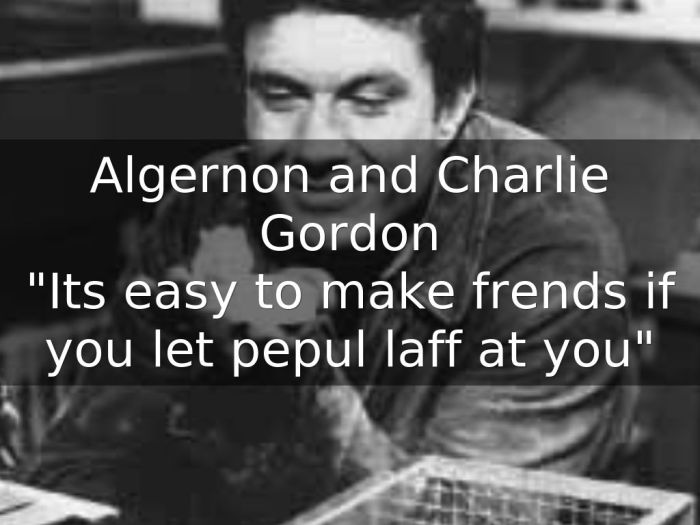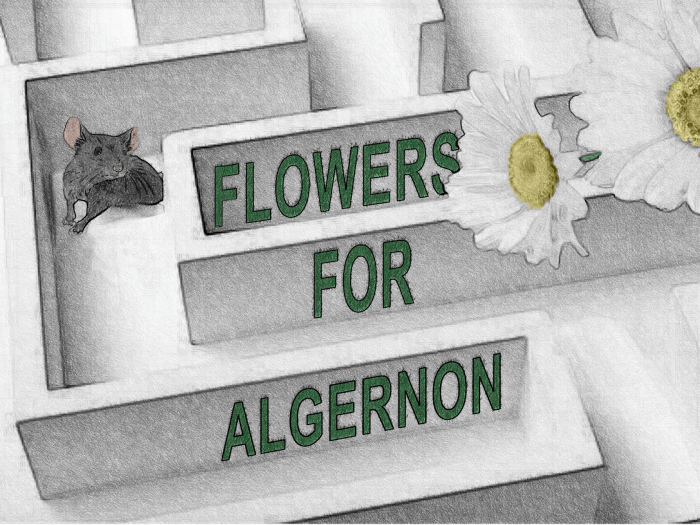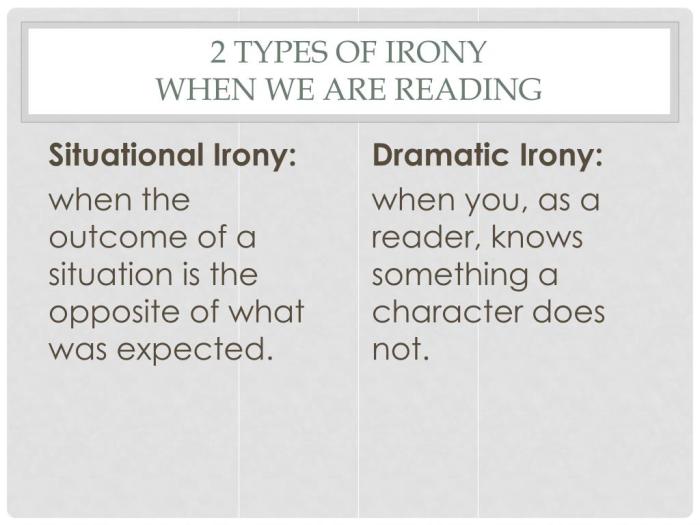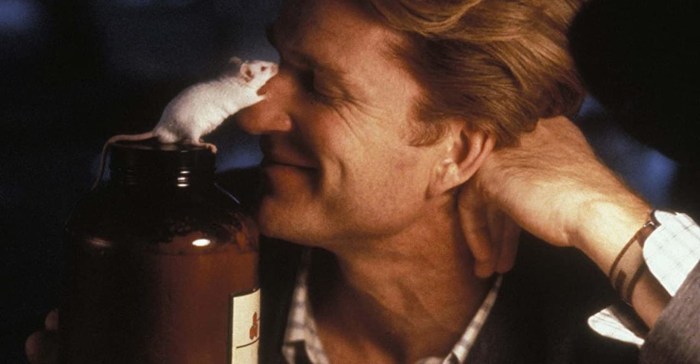Irony in flowers for algernon – Flowers for Algernon, a captivating novel by Daniel Keyes, delves into the profound and ironic complexities of human nature. Its protagonist, Charlie Gordon, embarks on an intellectual odyssey that unravels with unforeseen consequences, painting a poignant tapestry of hope and despair.
Charlie’s journey, marked by both triumph and tribulation, mirrors the novel’s broader exploration of themes such as the limits of human intelligence, the fragility of memory, and the complexities of morality.
Irony in Character Development

Charlie’s intellectual journey in Flowers for Algernonis a prime example of irony. His initial enthusiasm and optimism about the surgery and its potential benefits stand in stark contrast to his eventual disillusionment and despair.
Charlie’s Intellectual Journey
- Initially, Charlie is eager to undergo the surgery, believing it will transform his life for the better.
- However, as his intelligence rapidly increases, he begins to realize the limitations and challenges that come with it.
- He becomes aware of his own shortcomings, the superficiality of others, and the harsh realities of the world.
- This newfound knowledge leads to a profound sense of isolation and alienation.
Regression to Childlike State
The ultimate irony in Charlie’s story is his regression to a childlike state after his surgery. Having achieved his greatest intellectual heights, he loses all of his newfound knowledge and abilities.
- This reversal highlights the transient nature of human intelligence and the fragility of human existence.
- It also serves as a reminder of the importance of embracing our own limitations and finding contentment in what we have.
Irony in Narrative Structure

The story’s episodic structure, with its alternating flashbacks and present-day narration, creates a profound sense of irony. The flashbacks reveal Charlie’s naive and ambitious aspirations before the surgery, contrasting sharply with his deteriorating mental state and disillusionment in the present.
This juxtaposition highlights the tragic irony of his journey, where his pursuit of intelligence ultimately leads to his downfall.
Use of Flashbacks and Foreshadowing, Irony in flowers for algernon
The flashbacks provide a glimpse into Charlie’s past, foreshadowing the ironic outcomes that await him. Early on, Charlie expresses his desire to become “smart like other people,” oblivious to the complexities and potential consequences of such a transformation. The reader, however, can sense the irony in these aspirations, knowing that Charlie’s intelligence will ultimately become his undoing.
Significance of the Novel’s Ending
The novel’s ending is a powerful testament to the irony of Charlie’s journey. After a brief resurgence of his intelligence, Charlie’s mind rapidly deteriorates, leaving him a shell of his former self. The reader is left with a profound sense of irony, as Charlie’s pursuit of intelligence has ultimately robbed him of his humanity.
Irony in Themes and Symbolism

Flowers for Algernon explores several major themes, each expressed with a sense of irony that deepens the novel’s exploration of human nature and the complexities of progress.
The Pursuit of Knowledge and Intelligence
The novel ironically depicts the pursuit of knowledge and intelligence as a double-edged sword. While Charlie’s increased intelligence initially brings him joy and fulfillment, it also leads to a profound sense of isolation and alienation. He realizes that his newfound intelligence separates him from those he once loved and that his pursuit of knowledge has come at a great personal cost.
The Nature of Progress
The novel also explores the ironic nature of progress. The Algernon-Gordon Effect, which initially seems like a breakthrough in scientific advancement, ultimately proves to be a temporary and ultimately tragic solution. The novel suggests that progress is often accompanied by unintended consequences and that the pursuit of scientific advancement must be tempered with a sense of responsibility and caution.
The irony in Flowers for Algernon is that Charlie’s intelligence is increased only to be taken away, leaving him in a worse state than before. This irony can be compared to the airbag on off switch symbol airbag on off switch symbol . The airbag is designed to protect you in an accident, but it can also be turned off, potentially putting you at risk.
Similarly, Charlie’s intelligence gave him a brief glimpse of a better life, only to be taken away and leave him worse off.
The Complexity of Human Nature
Flowers for Algernon delves into the complexities of human nature, revealing the inherent contradictions and paradoxes that exist within us. Charlie’s transformation highlights the tension between our desire for knowledge and our need for connection and belonging. The novel ironically explores how our greatest strengths can also be our greatest weaknesses and how the pursuit of one aspect of ourselves can come at the expense of others.
Irony in Literary Devices

In Flowers for Algernon, irony is employed through various literary devices such as language, imagery, and metaphors, contributing significantly to the novel’s ironic tone. These devices often present a contrast between the surface meaning and the underlying reality, highlighting the complexities and contradictions within the characters and the narrative.
Language
The novel’s language is replete with irony, particularly in the use of euphemisms and understatement. For instance, when Algernon’s intelligence begins to decline, the doctors refer to it as “regression” rather than “deterioration,” downplaying the severity of his condition. Similarly, when Charlie’s intelligence surpasses that of the scientists, they describe it as “a temporary plateau,” suggesting that his progress is not sustainable.
Imagery
The novel’s imagery also contributes to its ironic tone. For example, the image of Algernon, the once-intelligent mouse, reduced to a helpless creature, serves as a poignant reminder of Charlie’s own inevitable decline. Additionally, the recurring motif of flowers, traditionally associated with beauty and life, is ironically juxtaposed with the themes of decay and death that permeate the novel.
Metaphors
Metaphors are extensively used to convey the novel’s ironic themes. The metaphor of the “Algernon-Charlie experiment” suggests that the pursuit of scientific advancement can come at a great cost. Similarly, the metaphor of Charlie’s “mind as a candle” highlights the fragility and impermanence of human intelligence.
Common Queries: Irony In Flowers For Algernon
What is the central irony in Flowers for Algernon?
The central irony lies in Charlie’s initial optimism and enthusiasm for his surgery, which ultimately leads to his downfall and disillusionment.
How does the narrative structure contribute to the irony?
The use of flashbacks and foreshadowing creates a sense of inevitability, highlighting the tragic trajectory of Charlie’s journey.
What are some key symbols in the novel?
Flowers represent hope and beauty, while Algernon symbolizes the fragility and impermanence of intelligence.